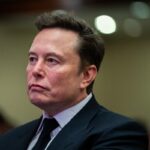Elon Musk doesn’t seem like someone who can be beaten. He fought the auto industry giants with Tesla—and won. He challenged the dominance of NASA and global aerospace powers with SpaceX—and succeeded. He even managed to wrestle Twitter, the unruliest tech company, and reshape it on his own terms. Yet somehow, it appears one person may have beaten Musk: Sam Altman, the cofounder and current CEO of OpenAI.
There have been so many questions swirling around Silicon Valley as of late, with people wondering how Musk is running behind Altman when it comes to the most consequential technology of our time: artificial intelligence. “I just don’t understand how Musk, who is the richest man on earth, who has taken on some of the most entrenched industries and beaten not only them, but their regulatory arms, too, lost to Sam Altman,” a Wall Street investor recently told me. “It just makes no sense.”
Who ultimately wins may come down the courts. On Friday, Musk and OpenAI jointly proposed holding a trial to adjudicate their dispute over the aforementioned company’s for-profit transition. As Business Insider put it in a headline, “Elon Musk and Sam Altman have finally agreed on something.”
Indeed, the two men despise each other. Last year Musk publicly attacked Altman as “not trustworthy,” saying in an interview that “I don’t trust OpenAI…[and] Sam Altman. I don’t think we want to have the most powerful AI in the world controlled by someone who is not trustworthy.” And in February, Altman took a public swipe back at Musk, saying, “I wish he would just compete by building a better product.” Altman then added, “Probably his whole life is from a position of insecurity. I feel for the guy…. I don’t think he’s, like, a happy person.”
The war between Musk and Altman really began back in December 2015, when Musk, Altman, and a handful of Silicon Valley visionaries launched OpenAI with a bold mission: to ensure artificial intelligence would benefit humanity, rather than potentially destroy humanity—an idea that largely started after Musk and Larry Page got into a debate about robots and AI competing to take over the earth, something Page was all for, and Musk thankfully was very much against. Backed by $1 billion in donations, the nonprofit vowed to openly share research and prioritize safety. Musk and Altman, allies at first, passionately warned of AI’s existential dangers and sought to set a moral compass that could save humanity from itself—or at least its robot overlords.
“I really trust him,” Altman told Vanity Fair at the time when asked about working with Musk, who already had plenty of projects in the works. “The thing that Elon said, which was exactly what I was thinking, as well, is he was willing to trade the extra time for sleeping better at night,” Altman recalled. “As soon as he said that I was like, Yes. I feel that way.”
Almost immediately, the idealism of humanity-saving AI clashed with the reality of human egos and money. Advanced AI, it turns out, is wildly expensive. At the time Musk was worried OpenAI would fall behind Google’s DeepMind, and he proposed a drastic solution in late 2017, according to an OpenAI blog post: take control himself. It wasn’t just that Musk wanted to save humanity (although that was the original driving philosophy), but according to emails between Musk and other OpenAI executives, Musk saw the possibility of integrating OpenAI into his car company, which could benefit from some advanced AI for its driverless car tech and its own robotic ambitions.
But when Musk presented the idea Altman and other OpenAI founders pushed back. The disagreement boiled over in what one person who worked at OpenAI told me “was a shouting match between Sam and Elon in the middle of the OpenAI offices that ended with Musk storming out.” Publicly, Musk resigned by citing a conflict of interest with Tesla, and according to OpenAI’s blog post, Musk wrote in an email, “It seems to me that OpenAI today is burning cash and that the funding model cannot reach the scale to seriously compete with Google.” The former OpenAI executive I spoke with believed that Musk was distracted with other projects at the time and thought OpenAI would end the same way Altman’s last start-up did (it failed) and that would be the end of the story.





